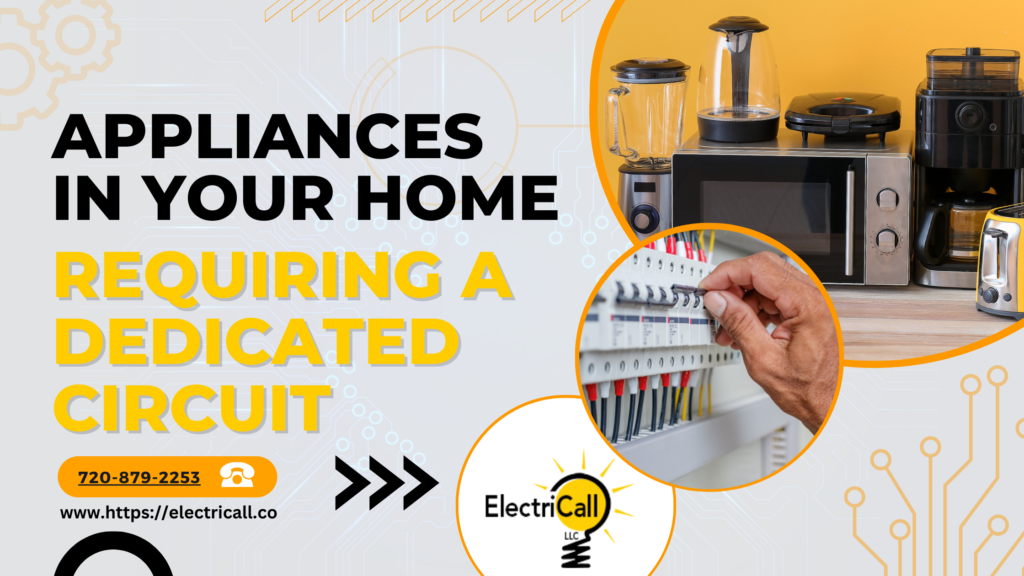
If you always reset a circuit breaker because of a circuit trip after connecting a major appliance, it’s time to reconnect the appliance to a dedicated circuit. While a standard residential electrical system is designed to handle high electrical capacities, some powerful home appliances may overload the system. In this situation, get a residential electrician to install a separate circuit for you.
How Does A Dedicated Circuit Work?
When an electrical contractor sets up a dedicated circuit, they add circuit breakers separate from the main shared circuit breakers in your electrical box. A dedicated circuit limits the amount of current running through your shared circuit, which helps avoid unsafe overheating, electrical overloads, and constant circuit breaker trips. With these electrical issues safely under control, your house will have a significantly reduced risk of electrical fire.
You can always contact a licensed electrician for help determining which home appliances need a dedicated circuit. This article, however, can still help you determine which appliances you may need to move to a dedicated circuit for a safer home.
Kitchen Appliances
On average, a kitchen uses the bulk of a home’s electricity. For this reason, the National Electrical Code requires that multiple circuits serve kitchens. The following are kitchen appliances that may require a dedicated circuit:
- Refrigerator.
- Electric Oven.
- Electrical Stove or Range.
- Dishwasher.
- Garbage disposal.
- Microwave oven.
- Deep fryer or air fryer.
- Countertop convection oven.
- Standalone freezer.
- Chest freezer.
Remember that different models use different wattages. However, not all appliances on the list need dedicated circuits. Therefore, in some cases, you can forego the need for a dedicated circuit by opting for a less energy-intensive model.
For older homes, we recommend you check your kitchen wiring system, as they tend to have systems that are not updated to handle modern appliances. Learn more about kitchen wiring from professional electricians in Denver, CO.
Laundry Room Appliances
The laundry room houses two of the most energy-intensive appliances in your home: your washing machine and dryer. Therefore, it is highly recommended that a dedicated circuit be installed for these appliances since they draw a lot of power. When in use, washing machines and dryers tend to stay on for a long time to complete their work.
These days, it’s common to have three different circuits supplying power to your laundry room. The three circuits perform the following purposes:
- The 20-amp circuit supplies 120 volts to the washing machine.
- 30-amp circuit for the electric dryer.
- A standard 15-amp circuit for lighting.
If you’re unsure if your laundry room has dedicated circuits, contact your nearest Denver electrician for an assessment.
Living Room And Bedroom Appliances
The living room circuit will depend on how electronic-laden you want the room to be and the wattage requirements of the devices you want to install. Most common living room appliances, such as flat-screen TVs, subwoofers, desktop computers, lamps, and fans, are low-demand electronics that can operate well with standard circuits. However, it is always a good idea to protect expensive living room appliances like TVs with surge-protected outlets.
Generally, you should consider living room and bedroom dedicated circuits if you connect your electrical system to any of the following appliances:
- Electric fireplace.
- Window air conditioners.
- Heaters (Infrared, fans, and space heaters).
Since these appliances are usually heavy-duty, they may require 30-to-50-amp dedicated circuits to operate safely.
Garage, Basement, Utility Room, And Outdoors Appliances
Whether you’re a DIY and craft enthusiast or just a regular homeowner with extra energy-intensive appliances, you may need dedicated circuits to safeguard your property’s electrical system.
The following appliances may need a dedicated circuit installed.
- Water heater pump.
- Electric baseboard heating system.
- Sump pump.
- Large air compressor.
- Heating and air conditioning units.
- Hot tub or jacuzzis.
- Spa.
- Pools.
- Power saw.
- Heavy drill equipment.
Most of these appliances require 30- to 50-amp circuits, while others that are not significantly energy intensive will need 15- to 50-amp circuits. Find an electrical contractor near you to help you determine which of your home appliances require dedicated circuits.
Choose The Right Size Of Dedicated Circuit For Your Appliances
Once you know which appliances need dedicated circuits, you’ll need to choose the right-sized circuits for them. A small circuit can cause repeated breaker trips, which will eventually wear out the circuit and lead to overheating and electrical fires. A licensed electrician can analyze your appliances and suggest the right-sized circuits for your needs.
They can also help you meet electric codes and requirements as a property owner. The National Electrical Code (NEC) and local governments have several electric wiring requirements to ensure the safety of homes and commercial buildings. Following these codes and laws is helpful when setting up new appliances at home.
Contact a trusted Denver Arvada electrician today with any questions about dedicated circuits and appliances.